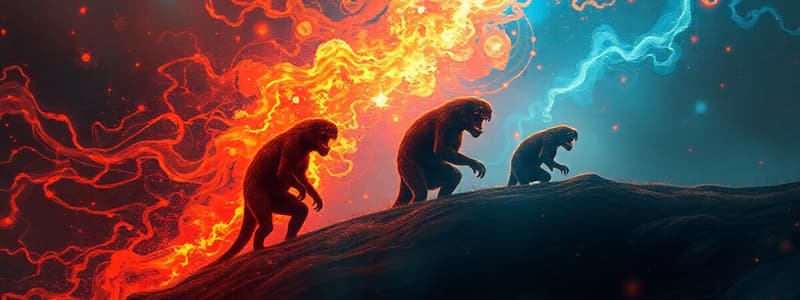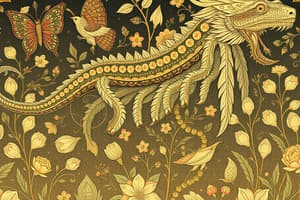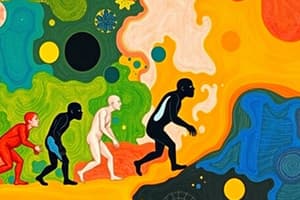Podcast
Questions and Answers
Which theory emphasizes the inheritance of acquired characteristics?
Which theory emphasizes the inheritance of acquired characteristics?
- Lamarck's Theory of Evolution (correct)
- Wallace's Theory of Speciation
- Mendel's Theory of Heredity
- Darwin's Theory of Natural Selection
Natural selection results in the elimination of all mutations from a population.
Natural selection results in the elimination of all mutations from a population.
False (B)
What is the primary difference between homozygous and heterozygous genotypes?
What is the primary difference between homozygous and heterozygous genotypes?
Homozygous has two identical alleles, while heterozygous has two different alleles.
The __________ trait is one that can be passed from parents to offspring.
The __________ trait is one that can be passed from parents to offspring.
Match the following terms with their definitions:
Match the following terms with their definitions:
What would happen to the colorful fish population if the coral reef started to lose its color?
What would happen to the colorful fish population if the coral reef started to lose its color?
All mutations are harmful to an organism.
All mutations are harmful to an organism.
Describe the sickle cell mutation and mention one advantage it provides.
Describe the sickle cell mutation and mention one advantage it provides.
What is the main distinction between natural selection and artificial selection?
What is the main distinction between natural selection and artificial selection?
Acquired traits can be inherited by offspring.
Acquired traits can be inherited by offspring.
Define mutation and provide an example.
Define mutation and provide an example.
The genotype for Sickle Cell Disease in a person who is homozygous recessive is ___.
The genotype for Sickle Cell Disease in a person who is homozygous recessive is ___.
Match the following concepts with their descriptions:
Match the following concepts with their descriptions:
What is one possible consequence of bacteria developing resistance to antibiotics?
What is one possible consequence of bacteria developing resistance to antibiotics?
The colorful offspring of silver fish are more likely to survive if their habitat loses its color.
The colorful offspring of silver fish are more likely to survive if their habitat loses its color.
What does it mean for an organism to be considered a new species?
What does it mean for an organism to be considered a new species?
Flashcards
Mutation Definition
Mutation Definition
A change in an organism's DNA sequence.
Variation Definition
Variation Definition
Differences in traits among individuals within a species.
Heredity Definition
Heredity Definition
Passing traits from parents to offspring.
Darwin vs. Lamarck
Darwin vs. Lamarck
Signup and view all the flashcards
Antibiotic Resistance
Antibiotic Resistance
Signup and view all the flashcards
Natural Selection Definition
Natural Selection Definition
Signup and view all the flashcards
Sickle Cell Genotype
Sickle Cell Genotype
Signup and view all the flashcards
Fossil Layers
Fossil Layers
Signup and view all the flashcards
What is an acquired trait?
What is an acquired trait?
Signup and view all the flashcards
What is a heritable trait?
What is a heritable trait?
Signup and view all the flashcards
What's the difference between phenotype and genotype?
What's the difference between phenotype and genotype?
Signup and view all the flashcards
What is homozygous?
What is homozygous?
Signup and view all the flashcards
What is heterozygous?
What is heterozygous?
Signup and view all the flashcards
What is artificial selection?
What is artificial selection?
Signup and view all the flashcards
What is natural selection?
What is natural selection?
Signup and view all the flashcards
What is the sixth extinction?
What is the sixth extinction?
Signup and view all the flashcards
Study Notes
Evolution Unit Study Guide
- Mutation: A change in DNA sequence. Example: sickle cell anemia.
- Variation: Differences in traits within a population. Example: different eye colors.
- Heredity: Passing traits from parents to offspring. Example: eye color.
- Charles Darwin's Theory vs. Jean-Baptiste Lamarck's Theory: Darwin's Theory focuses on natural selection and adaptation over time, while Lamarck's theory proposed acquired traits could be inherited.
- Antibiotic Resistance: Bacteria can develop mutations allowing them to survive exposure to antibiotics.
- Natural Selection: Organisms better adapted to their environment are more likely to survive and reproduce, passing on their advantageous traits.
- Artificial Selection: Humans select desirable traits for breeding, leading to specific characteristics in organisms.
- Acquired vs. Heritable Traits: Acquired traits are learned or developed during an organism's lifetime (e.g., language, riding a bike), while heritable ones are passed from parents to offspring (e.g., eye color).
- Sickle Cell Mutation: A genetic change causing abnormal hemoglobin, leading to sickle-shaped red blood cells. Pros: reduced risk of malaria, cons: anemia, pain.
- Homozygous Recessive - Sickle Cell Disease Genotype:* ss
- Phenotype: Observable characteristics (e.g., height and eye colour).
- Genotype: Genetic makeup (e.g., the combination of alleles).
- Homozygous: Having identical alleles for a particular gene.
- Heterozygous: Having different alleles for a particular gene.
- New Species Formation: A new species forms when a group within a population becomes reproductively isolated.
Dolphin and Fish Population
- Dolphin feeding habits: Dolphins eat both colorful and silver fish.
- Color change impact: If the coral reef loses its color, colorful fish may be less camouflaged, making them more vulnerable to predators.
- Impact of dolphin vision: If dolphins can see silver fish easier, the population of colorful fish may decrease because they are more visible to predators.
- Color change in fish: The change in coloration is likely due to natural selection, where silver fish are better camouflaged, making them more likely to survive and pass on their genes.
Evolutionary Tree
- Evolutionary relationships: The diagram shows the evolutionary relationships between different species, with the common ancestor at the base.
- Extinct and extant species: The tree indicates which species existed before others, and which species are still around.
- Shared Ancestry: The closer two species are on the tree, the more recently they shared a common ancestor.
Additional Questions
- Insect vs Mammal species: Insects are more numerous than mammals.
- Fossil Formation: Fossils found in lower layers are older than those in upper layers, indicating a chronological order.
- Evolution of land mammals into whales: Adaptations occurred to facilitate life in the water, gradually.
- Sixth Extinction: A period of significant loss of species.
- Human evolution and impact Humans are affected by evolution, but also affect evolution. Examples are antibiotic resistance.
- Bacteria: Unicellular.
- Punnett Square Probability: A Punnett Square is used to predict the probability of genotypes of offspring from parents with known genotypes.
Studying That Suits You
Use AI to generate personalized quizzes and flashcards to suit your learning preferences.




